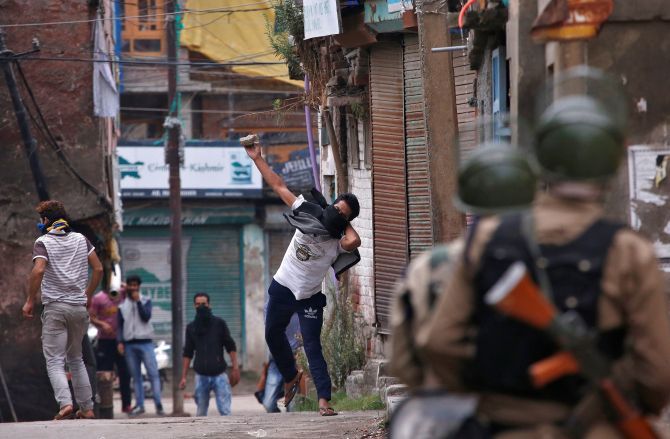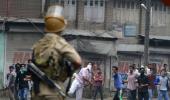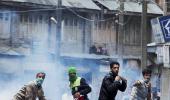
The Centre on Monday told the Supreme Court it was exploring a crowd control option that is akin to rubber bullets but not as lethal as pellet guns that are being used as a last resort to quell violence in the Kashmir Valley.
Attorney General Mukul Rohatgi made this submission after he said that the Centre has examined other alternatives to pellet guns like skunk water, laser dazzler and chilli-filled pava shells which are found to be “not so successful” like the controversial pellet guns.
The submission came after the apex court dubbed as “very important” the issues arising out of the use of pellet guns to deal with violent mobs in the Valley.
The court, which also said that it is a “sensitive issue”, warned Jammu and Kashmir high court bar association, Srinagar, which has sought ban on use of pellet guns, from politicising the matter, saying it cannot take sides as “it is neither against the security forces nor with the protesters”.
It also perused the report dealing with the strategies and methods to deal with violent mobs including UN-approved skunk water, a non-lethal foul smelling liquid developed by Israel for crowd control.
Rohatgi placed before the court an expert committee report and said options of using laser dazzler, a non-lethal intense radiation used to temporarily disable its target, high intensity noise devices, chilli-filed pava shells and rubber guns were deliberated upon and were “found not to be so successful” in comparison to pellet guns.
Rohatgi, who said he cannot show or read in open court the April 7 document, also referred to what he called a secret option by stating that “now we are looking at another option and I am not making it public. It is akin to rubber bullets but not lethal as pellet guns”.
He told a bench headed by Chief Justice J S Khehar that a “new standard operative procedure” will be used to deal with violent mobs as during the protests between July 8 and August 11, 2016, a total of 1,775 Central Reserve Police Force personnel have been injured out of which 79 were grievously injured.
The Attorney General said the use of traditional drills are perfect if the crowd is at a distance up to 300 metres but if they are advancing and is upon the security forces and are 10 metres away from its vehicles and the life is in danger then as a last resort pellet guns are used.
The bench, also comprising Justices D Y Chandrachud and S K Kaul, asked the bar body to take its time and respond within two weeks the issues raised by the Centre through an affidavit by telling that people in the bar “are in effective position to bring out the true factual position and assist the court in giving directions which would be meaningful”.
“This is an important issue and we feel you can play an important role. The question is whether you scuttle the position in which you are or play an important role. You are a privileged person. Today, you are in a position that you can help but you have to be balanced,” the bench said before posting the matter for April 28.
During the hearing, the bench noted that the largest casualties during the clashes involved minors, students and youths ranging from age-group of 13 to 24 years.
Rohatgi, who described as “critical” and “delicate” the situation in the Valley where the protests are violent, sought dismissal of the petition and said “it is unfortunate that
because of the proximity to the border the situation has been fuelled”.
“Crowds seem to be going into the hands of someone who has ulterior motives,” he said, adding it has to be understood that “we are not a rogue force” and “we are conscious of the situation and consistently looking if any alternative can be used”.
When senior advocate Zafar Shah and advocate Mian Abdul Quayoom, appearing for the bar body, made the submission and tried to portray that the arguments of the Attorney General were far from the reality, the bench asked them to utilise this chance for evolving a solution and not point fingers.
The two lawyers used to opportunity in the apex court to rake up the bye-elections held yesterday in the Valley which saw only 7 per cent polling and witnessed deadly violence claiming eight lives and leaving more than 100 security persons injured in the clashes.
One of the advocates raised the question “is the Central government at war with the people” while another counsel said it is turning out to be the “nation of blinded people”.
The senior advocate took the liberty to state that “solution is perhaps not within the system and there is some problem within the system”.
However, the bench said, “If the solution is from outside the system, we cannot interfere and perhaps you are saying that we cannot interfere.”
The bench further said, “Both lawyers and judges stand on the same side of rule of law”.
“Do not politicise. You just keep away from politicising it. You will go wrong if you will politicise it. You give us the means and measures for solution. Do not point out
fingers,” the bench said.
CJI Khehar took an opportunity to get an answer by narrating a story that “suppose as a child, I live in a wooden house and if a mob comes to hurl a petrol bomb, what will I do?”
The senior advocate appearing for the bar said, “One can go to any extent to protect his life”.
At this point, the CJI said, “You are in a very important situation. You are neither in this side nor that side. You are practising law. You cannot take a side. You have to take a right position. We also have to say right or wrong. You are here to help the state.
“Bar in the country has played greatest role in the time of crisis. Bar cannot become a party to a movement,” he said.
When advocate Quayoom repeated that it is a nation of blinded people and indiscriminately and arbitrarily the pellet guns are used, the bench retorted, “What are these children doing in the mob? These are children of delicate age. They are not above 21 years. Ninety-five per cent of them are students and the upper age limit of hardly 24.”
The bench said if the suggestion is for not using pellet guns, what would have been the casualty if other weapons were used.
“We appreciate that you are seeing the reality there. As per you, 20,000 to 30,000 shots were fired. If these pellet guns were not used and instead regular guns were used, then at least 20,000 people could have died. Deaths are there. It is very unfortunate. It has to be stopped but how can they allow destruction of public properties,” the bench said.
“You are a bar body. You feel for your people and your state. You feel that the other side (security forces) starts it and not the mob. You are educated, qualified and are experts but why you do not do anything by lodging complaints if you feel that the other side is wrong. Why cannot you take it to the court with evidence,” the court said.
It added, “You are very important. Help in larger issue by taking into account the totality of the circumstances. Try to help us in reaching to the solution”.











 © 2025
© 2025